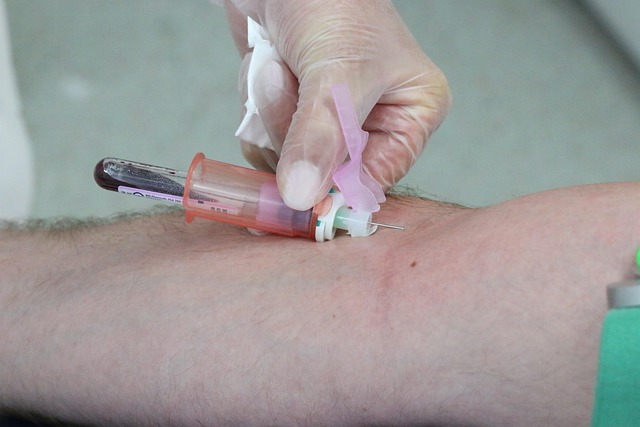A complete blood test (FBC/CMP) is a powerful diagnostic tool that evaluates red blood cells, white blood cells, platelets, and serum proteins to identify vitamin deficiencies. Levels of vitamins B12, D, A, C, and K are crucial indicators, with specific deficiencies leading to distinct abnormalities. By comparing results against reference ranges, healthcare professionals can pinpoint nutrient gaps, guiding personalized dietary changes, supplements, and lifestyle adjustments for optimal health.
A complete blood test (CBT) is a powerful tool for identifying potential vitamin deficiencies that may go unnoticed. By analyzing various components of your blood, from red and white blood cells to plasma levels, health professionals can uncover subtle signs of nutritional gaps. Understanding the CBT results can provide insights into specific vitamin deficiencies, enabling targeted interventions to optimize your overall well-being.
- What is a Complete Blood Test?
- Understanding Vitamin Deficiencies Through Blood Analysis
- Interpreting Results and Next Steps
What is a Complete Blood Test?
A complete blood test, also known as a full blood count (FBC) or comprehensive metabolic panel (CMP), is a fundamental tool in diagnosing various health conditions, including vitamin deficiencies. It provides a detailed snapshot of your overall health by examining different components of your blood. This test measures and evaluates red blood cells, white blood cells, platelets, and various serum proteins, offering insights into both anemic and inflammatory states.
In the context of vitamin deficiencies, a complete blood test can help identify specific nutrient gaps. For instance, it can reveal low levels of hemoglobin, indicating iron or vitamin B12 deficiency anemia. Deficiencies in vitamins like B6, B9 (folate), or C might show abnormal white blood cell counts or altered platelet levels. By analyzing these parameters, healthcare professionals can guide personalized treatment plans to address the underlying vitamin deficiencies and promote optimal health.
Understanding Vitamin Deficiencies Through Blood Analysis
Understanding Vitamin Deficiencies Through Blood Analysis
A blood test for vitamin deficiency is a crucial tool in identifying and addressing nutrient gaps in your body. This simple yet powerful procedure involves drawing a small sample of your blood to analyze various vitamins and minerals. By examining levels of essential vitamins like B12, D, A, C, and K, healthcare professionals can gain valuable insights into your overall health and nutritional status.
The results from a blood test for vitamin deficiency offer a clear picture of which specific vitamins are present or lacking in your system. This information is critical in tailoring dietary recommendations and supplement regimens to meet your unique needs. Whether it’s a deficiency in vitamin D, known for its role in bone health, or a lack of B12, essential for nerve function, identifying these gaps enables you and your healthcare provider to make informed decisions to optimize your well-being.
Interpreting Results and Next Steps
Interpreting your complete blood test results is a crucial step in understanding your vitamin deficiencies, if any. Each laboratory will have its reference ranges for various nutrients, so it’s essential to compare your values with these standards. For instance, low levels of vitamin D might be indicated by a 25(OH)D concentration below the lab’s lower reference limit. Similarly, iron deficiency could be suggested by a reduced ferritin level.
Once you have your results, the next step is to consult a healthcare professional who can help interpret them accurately and provide tailored advice. They may recommend dietary changes, such as incorporating more vitamin-rich foods or considering supplements. Additionally, lifestyle factors affecting nutrient absorption should also be addressed.
A complete blood test (CBT) offers a comprehensive way to understand and address vitamin deficiencies. By analyzing various components of your blood, this test provides valuable insights into your overall nutritional status, allowing for targeted interventions. Interpreting the results can guide discussions with healthcare professionals who will recommend personalized next steps, such as dietary adjustments or supplementation, to optimize your health and ensure adequate vitamin levels. For those concerned about vitamin deficiencies, a CBT is a powerful tool to take charge of their well-being.
